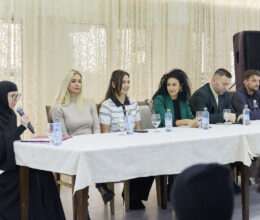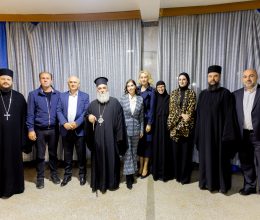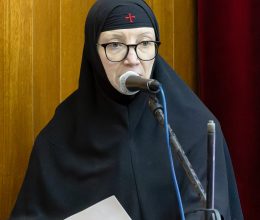Address by Archimandrite Cyril Bigorski at the first interfaith forum in Debar on the topic: “The Family: Pillar of Love and Social Development,” held on November 9, 2024, the Year of the Savior.
Honorable attendees,
It is with profound honor and joy that we gather today in this renowned and noble city of Debar, a city that, through the centuries, has served as a living symbol of coexistence, mutual respect, and fraternity. Here, Christian and Muslim communities have always remained close, families have cherished core values within their homes, and the spirit of openness and mutual understanding has been carefully passed down from generation to generation. Naturally, there have been moments of adversity, situations where discord, disrespect, and hatred attempted to take root. However, in this city, history thankfully remembers the good examples and those who worked toward unity. Here, the love and respect for one’s neighbor are cultivated on a daily basis, making Debar an unrivaled example in our country of unity and respect for diversity.
My Elder and Abbot, His Grace Bishop Parthenius of Antania, whose blessing allows me to stand here today, often highlights this very quality of the people of Debar—their culture of coexistence, broad-mindedness, and openness. He honors and supports their efforts to uphold a shared life of mutual respect, and I believe that our presence here today is a result of the city’s longstanding tradition of unity and mutual respect, which holds immense significance not only for Debar but, I dare say, for the world.
Thus, I extend my gratitude to all those who contributed to organizing this wonderful forum, particularly to the Mayor of Debar Municipality, Mr. Hekuran Duka, our Elder, Bishop Parthenius of Antania, whose blessing has brought us here this evening, and the esteemed Mufti of the Debar Muftiate, Mr. Reshat Kachalniku.
I stand before you as an Orthodox monk and priest, and I will briefly present the Orthodox Church’s perspective on marriage and family, just as the esteemed Imam Mr. Orhan Zengo thoughtfully and insightfully did on behalf of the Islamic community. Our shared goal is to strengthen the family values that are integral to both of our religious communities—Christian and Muslim alike—and, in doing so, to further cultivate the spirit of unity that has always flourished in this cherished city.
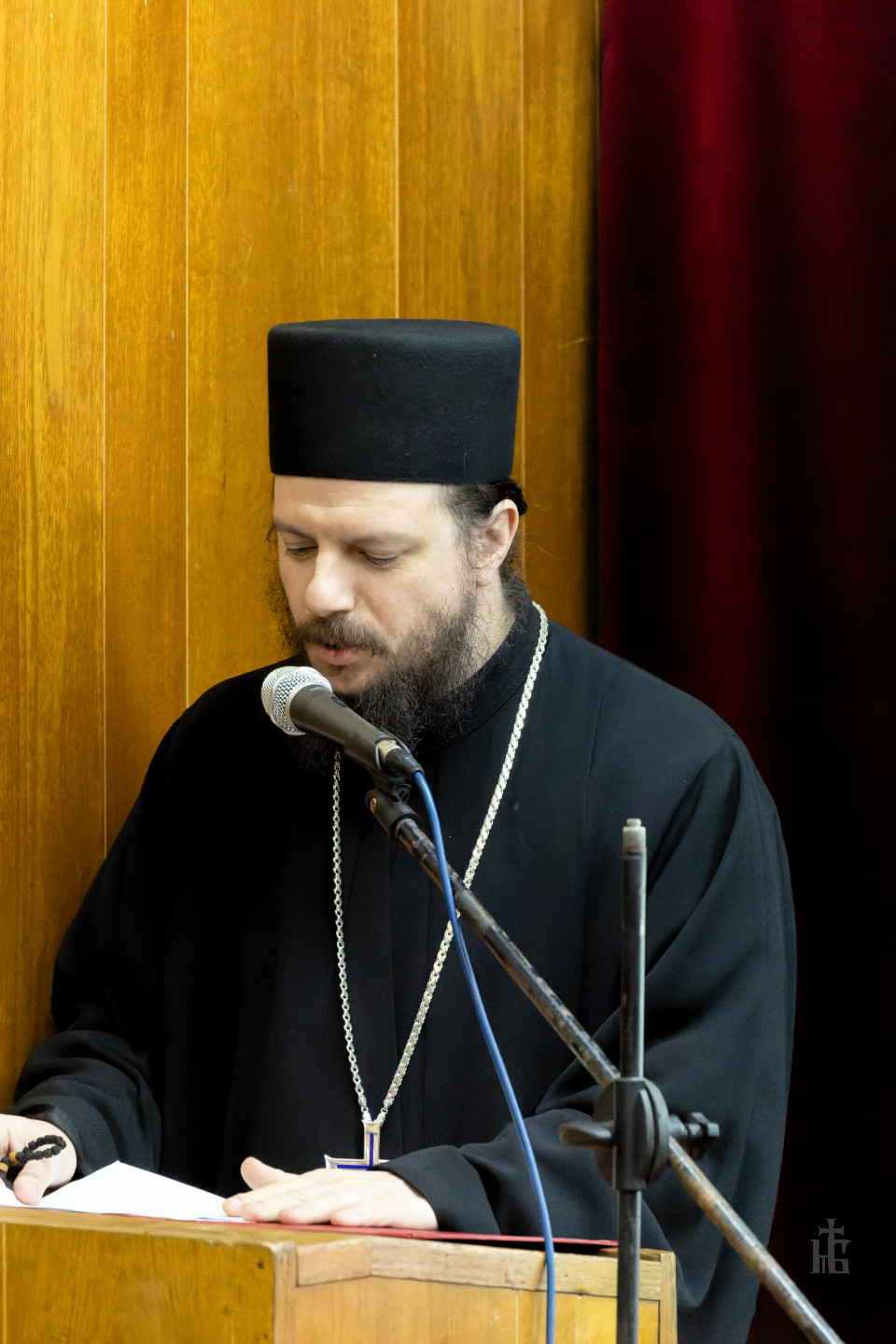
Allow me, with deep respect for each of you, to begin my remarks on family and marriage according to the teachings of the Orthodox Church, assuring you that we are inspired by the same aspirations for love, understanding, and respect—a spirit that emanates from the one God, who takes special joy in seeing us all here—Christians and Muslims, Macedonians, Albanians, and Turks—strive to live as brothers, for indeed, that is what we are.
I will begin my discussion on family with a quote from my niece Koprina, who, at the tender age of four, said, “How sad the world would be without my parents! I would be so sad. If you die, I will die too.” These seemingly innocent, childlike words hold a profound ontological truth: humanity has an essential need for a healthy, functional family. A child needs both a mother and a father. We all need parents. Indeed, the concept of parenthood originates from God Himself, the ultimate Father of all people. In Christian revelation, this principle of divine parenthood was first shown to us by the Son of God, our Lord Jesus Christ, who taught His disciples to address God as Father: “Our Father, who art in heaven…”
I share these thoughts to emphasize the essential importance of parenthood as a fundamental element and cornerstone of the family. We see that children intuitively and naturally recognize the role of parents. By the natural order of things and through bio-psychological needs, they desire one woman as their mother and one man as their father. I believe that children perceive the role of a family most purely and without bias, perhaps even defining it most accurately. The question is, how do adults view the family today?
In our era, we are witnessing an aggressively promoted trend that seeks to redefine the traditional concepts of marriage and family. According to my Elder and teacher in monastic life, Bishop Parthenius, “Marriage between one man and one woman, as it has been known for centuries, is not merely a social contract but also a civilizational achievement of Christianity, deeply rooted in the gospel’s thought and culture. Christianity transformed the ancient institution of marriage by infusing it with sanctity and a profound spiritual dimension. In the ancient world, before the teachings of Christianity, marriage often had practical and economic aims, and polygamy as well as various informal unions were widely accepted. With the advent of Christianity, marriage was no longer seen solely as a social union, but as a great sacrament—a sacred bond between one man and one woman, founded upon love and fidelity. Marriage is, in fact, a reflection of Christ’s love for the Church, establishing the ideal of unity and exclusivity within a community in which man and woman are united not only physically, but above all, spiritually.
Thus, Christian marriage becomes a school of love, where husband and wife learn self-sacrifice, patience, and mutual respect, directly contributing to the formation of a moral and stable society. In this sense, Christian marriage is not merely a personal choice but a civilizational pillar that brings order, stability, and humanity to the social fabric. It is the foundation upon which European civilization rests, rooted in the biblical notion of the creation of humankind—man and woman—as a unified whole. A true Christian marriage is a workshop for holiness.”
We now live in a time when these age-old principles and spiritual-social benefits are being forgotten. We constantly hear new definitions of what marriage and family are. Discussions now include families with same-sex parents, cohabitating families, substitute families, surrogate motherhood, and so on. Yet all these definitions concern only the social and legal aspects of marital union, with none addressing its essential spiritual dimension. In a word, modern concepts reduce the fundamental unit of society to a purely human construct, a human institution. Furthermore, these concepts evidently prove unhealthy for the human person, promoting models that, rather than advancing humanity, bring about sociological, cultural, and psychological degeneration.

Thus, it must not be forgotten that marriage is, above all, a Divine institution, an establishment designed and blessed by God Himself. Indeed, in the very first pages of Holy Scripture, we read that from the beginning, at the creation of the material world, the Lord created Adam and Eve, man and woman, and blessed them for married life: “So God created man in His own image; in the image of God He created him; male and female He created them. Then God blessed them, and God said to them, ‘Be fruitful and multiply; fill the earth and subdue it'” (Genesis 1:27-28). We see, then, that from the very start, the Lord established marriage as a sacred and divine union, one that deeply reflects His love and providential care for humanity. At the moment of creation, God not only formed Adam and Eve—the first mother and father—but blessed them with the commandment to be fruitful and multiply, making them collaborators in His work of creation. This is no ordinary natural calling; it is an invitation to participate in a shared creative act with the Creator Himself. In this way, humankind becomes co-creator with God.
In marriage, according to God’s Divine Economy, man and woman become “one flesh” (Genesis 2:24) and, in so doing, mystically reveal the truth that love is the essence of the Divine nature, and that humankind, made in the image and likeness of God, is called to participate in that love. Marriage embodies the image of God in the world through the loving and creative union between man and woman, a union that is not merely biological, but ontological, as it fundamentally reflects the communion of love and unity within the Holy Trinity.
The blessing that the Lord gave to the first humans is more than a blessing for life; it is a calling to sacramental service, to a life in communion where love is not merely an emotion, and even less so a passion, but a way of being. Man and woman are blessed to “be fruitful and multiply,” thus transforming marriage into a source of life, just as God is the Source of life. In this way, marital love becomes an “icon” of Divine love, continually renewing and embodying the bond between the Creator and His creation. Marriage, then, assumes the dimension of an exalted service, calling spouses to live in a love that is free, unconditional, and prepared for sacrifice—the same kind of love Christ showed for the Church, sacrificing Himself for it. Therefore, marriage is not merely a natural union, but a Divine creation, within which people are transformed and ennobled, fulfilling their calling as the image and likeness of God.
Furthermore, the importance of marriage as a Divine institution is underscored at the very beginning of the New Testament, in the Law of Grace. Saint John the Theologian, the Apostle of Love, testifies that the first miracle performed by the incarnate Word of God on Earth was at a wedding in the small Galilean town of Cana. There, at the wedding of relatives of the Holy Virgin Mary, the Lord Jesus Christ, at the request of His pure Mother, turned water into wine when the wedding’s supply had run out. Thus, Jesus began His miracles at Cana of Galilee, revealing His glory, and His disciples believed in Him (John 2:11). It was no coincidence that, in the spiritual re-creation of the world, the Lord chose to begin His miraculous works at a wedding, at the holy mystery of marriage, underscoring once more its Divine significance. This miracle at Cana is not only a sign of God’s mercy but a profound revelation of the Divine nature of marriage. Christ’s presence at the wedding serves as a testament to His support of the marital union, elevating it from a simple human agreement to a sacred sacrament of love. In the moment that the Lord transforms water into wine, the ordinary joy of human celebration is infused with Divine power, and marriage is transformed into a sacred participation in God’s love and generosity.
This miracle carries deep theological significance: just as in the Old Testament, God created man and woman as bearers of life, so now, in the New Testament, He declares marriage as a mystery of love and the first step toward salvation. By being present at the wedding, Christ not only blesses the union of man and woman but also prepares them for the higher purpose of marriage—the union with God. This event points to marriage as a path to eternity, a space where love is sanctified and grows into a reflection of His unfailing love for humanity. In a word, through Christ, marriage becomes a new covenantal bond between God and humankind. Through this, the Lord calls us to a profound reverence for this institution, which is not merely a social act but a Divine mystery that directs human life toward Heaven.
Returning to the words of my niece: “How sad the world would be without parents!” According to the natural order, children need parents in every aspect of their lives. The need for the warmth, presence, and support of parents is immense and invaluable—it is built into the very being of a child. Yet, the dilemma of our time, in this age of technocracy and relentless pursuit of material values and modern trends, is whether parents are truly present for their children. We live in a society that values visible successes, where people are assessed by their social media image, the size of their income, and the prestige of their position. This relentless rhythm impoverishes the human soul, distancing us from the fundamental relationships that enrich life. Parents, often blinded by new ideals of success and self-fulfillment, increasingly fall victim to social media addiction and the soulless race for career advancement and wealth, prioritizing their digital image over family closeness.
The hidden cost of this obsession exacts a heavy toll: in lost moments, lost presence, and lost upbringing. Through the child’s eyes, parents seem distant, absent—even when they are physically present. How sad it is when children search for their parents’ gaze but instead encounter screens glowing with a different kind of light, one that is cold and illusory rather than warm and life-giving. The screens that steal parents’ attention silently tell the child that their time and love are not valued. A child longs for a mother and father, not successful businesspeople or polished digital images.
In this endless, and I would say aimless, race, adults lose touch with the true blessing of parenthood—the opportunity to be both physical and spiritual guides, to be teachers, to impart wisdom, to offer a shoulder, to open their hearts, to share moments of tenderness and understanding. No expensive gift or superficial gesture of attention can replace a parent’s presence. Every child longs for the warmth of a parental word, for attention that demands nothing but love and patience. Yet, in this new world of paradoxical communication and superficial connections, the child is left with a deep sense of sadness and loneliness—in a world that has everything except their parents.
Thus, the question remains open and painful: are parents still there for their children in such a world? And do they, in their pursuit of success and fame, forget that true wealth and true glory lie within the hearts of their children, in the pure love that only a child can offer? “A woman, when she is in labor, has sorrow because her hour has come; but as soon as she has given birth to the child, she no longer remembers the anguish, for joy that a human being has been born into the world,” says the Savior of the world (John 16:21).
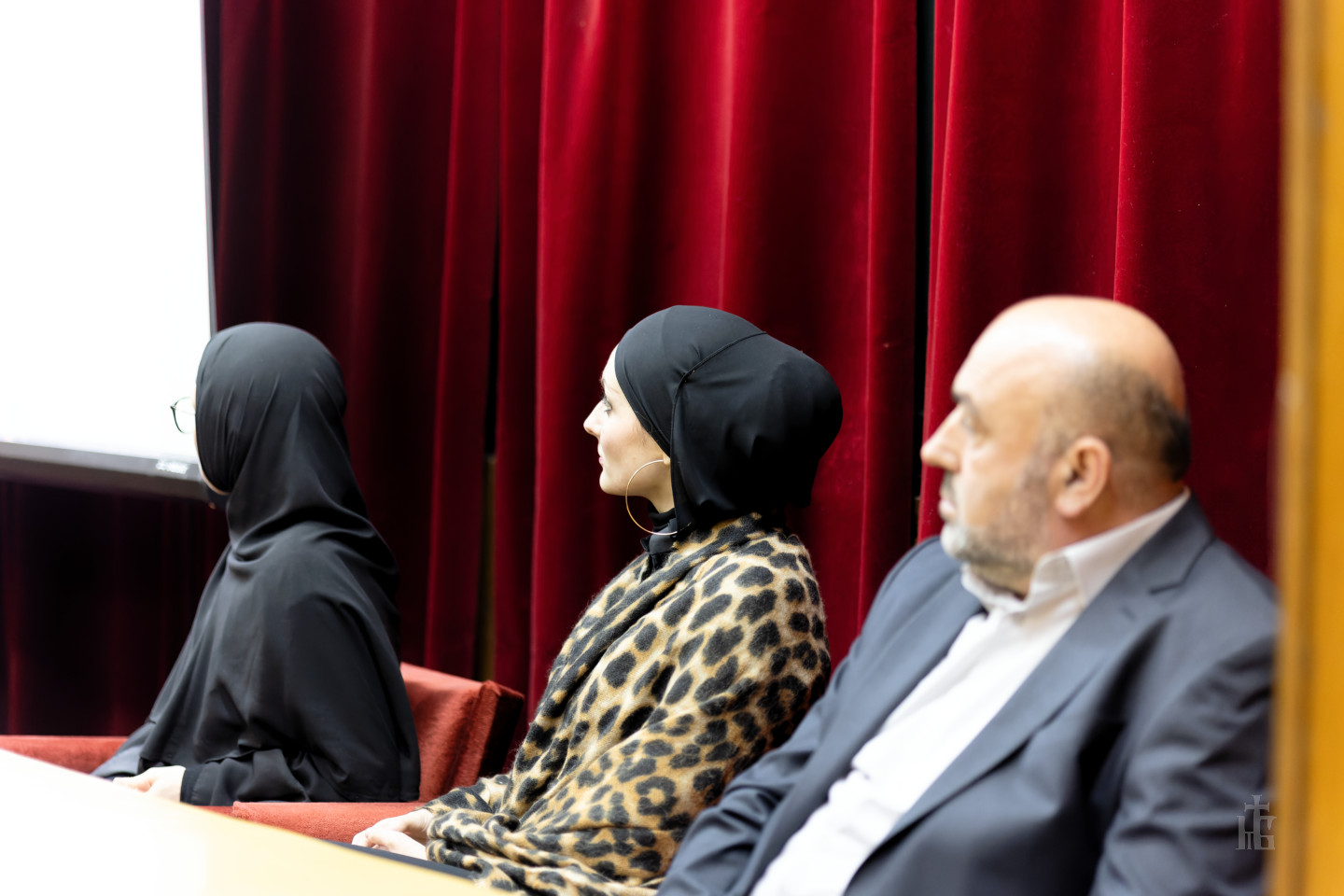
In a world filled with rapid changes and relentless challenges, the family remains the pillar of love and values that shape future generations and uphold social order. This pillar is essential for the spiritual health and well-being of every community, which is why it must be strengthened through the collective efforts of all religious and social entities. Christ’s teachings reveal the family as an icon of Divine love, the foundation of society, and the smallest yet holiest community, crafted according to God’s wise design. This message about the value of family, which has also permeated Islamic tradition, should inspire us toward collective action and mutual support in preserving family values.
Both the doctrine of Christian anthropology and the Islamic tradition recognize the family as a key community where responsibility, hard work, patience, honor, integrity, and respect are instilled. United in a common aspiration to nurture and develop healthy and stable individuals, both religious communities can and must build bridges of coexistence that will strengthen our common home, our socio-cultural space, and our most precious and sacred treasure—the family. Thus, it is vital that we pass on this shared vision of the family as the fundamental unit of society, irrespective of religious affiliation, and work together to promote and protect genuine family values.
In this spirit, as my Elder, Bishop Parthenius of Antania, teaches, “Every family, when blessed by love and goodness, becomes a place where the earthly meets the heavenly, where God’s light encounters the human soul.” May this very light guide all of us—Christians and Muslims alike—in preserving the family as the pillar of our shared future and as a space where God’s love, which unites us all, is reflected.
Thank you for your attention!
